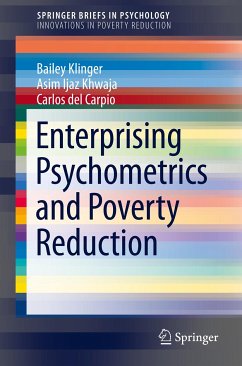Enterprising Psychometrics and Poverty Reduction sets out in accessible detail this innovative approach to risk evaluation, which uses methods similar to psychometric tools used in corporate hiring. The book evaluates this approach in six financial organizations in Kenya, Colombia, Peru, and South Africa, with extensive charts and tables breaking down each program's profitability and effectiveness. Especially by eliminating disparities that prevent women from accessing credit, this assistance fuels long-range economic growth and general well-being. This concise volume:
- Explains the psychometric approach to credit and its methodologies.
- Identifies core characteristics shared by successful small business owners.
- Outlines a novel approach to credit scoring models for small businesses.
- Reviews the relevant literature on personality and personality testing.
- Features representative success stories.
- Discusses implications for implementing psychometric loan technologies in banks worldwide, and its potential relationship to training programs.
Enterprising Psychometrics and Poverty Reduction offers message and methods to professionals and researchers in psychology, economics, development, and finance, especially those involved in global development, the psychology of poverty reduction, banking in emerging markets, and NGOs.
Dieser Download kann aus rechtlichen Gründen nur mit Rechnungsadresse in A, B, BG, CY, CZ, D, DK, EW, E, FIN, F, GR, HR, H, IRL, I, LT, L, LR, M, NL, PL, P, R, S, SLO, SK ausgeliefert werden.
Hinweis: Dieser Artikel kann nur an eine deutsche Lieferadresse ausgeliefert werden.
What to do? The three economists provide a very sensible and important answer: Evaluate the person him- or herself by psychological tests. Two issues are important for paying back the loan: First the person must be able to build a good enterprise and make enough money to pay back the loan. Second, the person must be willing to pay back the loan.
Psychological research on entrepreneurship has made enough headway to provide good data for understanding which person characteristics lead to good entrepreneurial success. Moreover, there has been a longtradition to evaluate a person's integrity to understand whether somebody is willing to cheat others by not paying back a loan. The authors take these issues as their starting point and describe how they produce the results. This is practical and useful. Recently the New York Times has written a long piece on the company build by these three authors and how successful they have been in helping banks to help micro-entrepreneurs to get the resources to be able to succeed.
This is a "must-read" book for anybody who is interested to advance sustainable credits for micro-entrepreneurs."
Prof. Michael Frese, NUS Business School, Singapore









